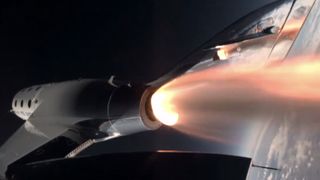
Virgin Galactic will fly again next month, if all goes according to plan.
The company announced on Wednesday (May 1) that it's targeting June 8 for its seventh commercial spaceflight, a suborbital jaunt called, fittingly enough, Galactic 07.
It will be Virgin Galactic's second spaceflight of the year, after the Galactic 06 mission on Jan. 26, and its 12th overall to date.
Related: Virgin Galactic launches researchers to suborbital space on 5th commercial flight (video)
Virgin Galactic uses an air-launch system that consists of two vehicles: A carrier aircraft called VMS Eve and a suborbital spaceliner known as VSS Unity.
Eve lifts off from a runway with Unity beneath its wings, then drops the spacecraft at an altitude of about 45,000 feet (13,700 meters). Unity then fires up its onboard rocket motor, blasting its way to suborbital space.
Passengers aboard the space plane experience a few minutes of weightlessness and get to see Earth against the blackness of space. A ticket to ride on Unity currently sells for $450,000.
Get the Space.com Newsletter
Breaking space news, the latest updates on rocket launches, skywatching events and more!
Galactic 07 will depart from Spaceport America in southwestern New Mexico, carrying four passengers in Unity's cabin. Virgin Galactic has not yet identified these people, but the company has given us a bit of information about them.
Three are private astronauts, one apiece from New York, California and Italy. The fourth is "an Axiom Space-affiliated researcher astronaut who will conduct multiple human-tended experiments," Virgin Galactic wrote Wednesday in a Galactic 07 mission update.
Axiom Space is a Houston-based company that has organized three crewed trips to the International Space Station to date, all of them using SpaceX hardware. Axiom also plans to assemble and operate its own space station in Earth orbit later in the 2020s.
During the Galactic 06 mission in January, an alignment pin that helps secure Unity to Eve detached unexpectedly from the carrier craft. This happened after Unity had separated and begun flying freely and did not endanger anyone involved in the flight, according to Virgin Galactic.
Nevertheless, the company conducted an investigation along with the U.S. Federal Aviation Administration (FAA). That work is now done, and steps have been taken to ensure the issue doesn't crop up on Galactic 07 or other future flights, according to Virgin Galactic.
"The FAA has accepted Virgin Galactic's final investigation report, as well as the corrective actions that have been made to enhance the retention mechanism of the pin and the addition of a secondary retention mechanism," the company wrote in Wednesday's update.
Join our Space Forums to keep talking space on the latest missions, night sky and more! And if you have a news tip, correction or comment, let us know at: community@space.com.

Michael Wall is a Senior Space Writer with Space.com and joined the team in 2010. He primarily covers exoplanets, spaceflight and military space, but has been known to dabble in the space art beat. His book about the search for alien life, "Out There," was published on Nov. 13, 2018. Before becoming a science writer, Michael worked as a herpetologist and wildlife biologist. He has a Ph.D. in evolutionary biology from the University of Sydney, Australia, a bachelor's degree from the University of Arizona, and a graduate certificate in science writing from the University of California, Santa Cruz. To find out what his latest project is, you can follow Michael on Twitter.
Most Popular

